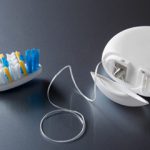
Day after day I get the same excuses for not flossing. “My fingers are too big”, “I forget”, “My fingers are too small”, “I’m on a liquid diet”, “My fingers have a mind of their own”, “It hurts my gums”, “My dog ate my floss”. Sound familiar? The bottom line is, if dental and health professionals didn’t think flossing was important; we would stop asking you to do it.
Flossing not only removes food particles but it also and more importantly removes the harmful bacteria and plaque that cause dental disease. Flossing 101 seems to be the key to ending most patient frustrations, unless medical conditions get in the way or the floss is still being fed to the dog. Here are instructions on flossing:
Dental professions do realize some people can’t floss due to arthritis or other functional and/or coordination problems. Let them know and together a plan can be worked out. Here is a list of devices, suggestions or other interdental aids that won’t be as effective but will help:
Seeing a new dentist can be an intimidating and a highly anxiety ridden experience. You are not familiar with the office, the doctor or the procedures
Read MoreI can’t tell you how many times I have asked a patient about a sore in their mouth that they were completely unaware of. Everyone gets sores in the mouth, that’s just the nature of the beast.
Read More